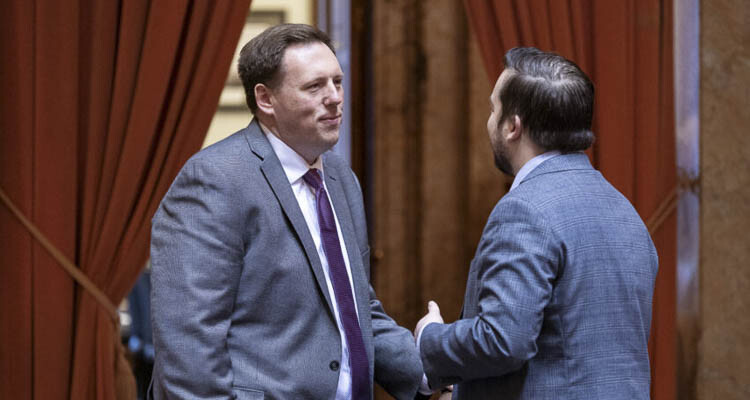
House Bill 2204 could provide a major boost to beverage producers during a disaster or state of emergency
Three bipartisan bills from Rep. Kevin Waters are one step closer to becoming law after receiving approval from the Washington State Senate this week, including one that could provide a major boost to beverage producers during a disaster or state of emergency.
House Bill 2204, which passed unanimously, would allow beverage producers a temporary emergency permit – with no fees – to move their place of business to another beverage producing company in the event a natural disaster forces them to close.
“It’s great to see these policies move forward and I’m excited to see the positive effects they will have if signed by the governor,” said Waters, R-Stevenson. “Particularly, House Bill 2204 will have a big impact if it becomes law. Last summer’s Tunnel 5 Fire in my district caused significant damage and affected many homes and businesses, including several beverage producers. Those beverage producers need this legislation.”
The fire forced several wineries to shut down production and sales. The remaining wineries offered to open their facilities to five other companies. However, current law does not allow that to happen.
“These producers took a big hit because of the fire and because there is no policy in place, there wasn’t anything we could do to help them,” said Waters. “That needs to change, so I’m very happy to see this policy reach the governor.”
The Senate also passed House Bill 1982, 48-1. It would codify the Community Economic Revitalization Board (CERB) Rural Broadband program. Since 2018, CERB has operated a Rural Broadband Program with funding from the capital budget, which provides grants and loans to local governments and federally recognized tribes.
The program finances the cost to build infrastructure to provide high-speed, open-access broadband service to rural and underserved communities for the purposes of economic or community development.
“I’m a member of CERB and I have seen the great work this board has done over the last five years with this loan and grant program, including infusing $38 million into broadband through other revenues,” said Waters. “They are a trusted partner for economic development within rural communities and have proven their commitment to these communities throughout Washington.”
Lastly, the Senate unanimously passed House Bill 2260, which would align the penalties for selling alcohol to a minor in Washington by authorizing the Liquor and Cannabis Board (LCB) to impose civil penalties on store clerks for unintentionally selling alcohol to minors.
Under current law, if a restaurant worker or bartender unintentionally serves alcohol to a minor, they are given a fine instead of being charged with a criminal penalty. However, when a store clerk unintentionally sells liquor to a minor, the only penalty available is a criminal one – a gross misdemeanor.
Waters explained why he sponsored the bill, saying, “Not only would this bipartisan legislation bring equity to the penalty structure for selling to a minor for servers, bartenders, and store clerks, but it would also address another overlooked issue: enforcement.
“In many cases, with rising crime rates statewide and despite the severity of the offense, officers and prosecutors don’t always have the time to enforce and prosecute these cases. Additionally, disparate caseloads across Washington results in current laws not being implemented uniformly throughout the state. Allowing for administrative penalties for a store clerk selling to a minor would give the LCB greater flexibility and better enforcement options.”
“We need to do what we can to bring balance to this issue, but more importantly, we need to enforce the law by holding offenders accountable,” said Waters.
The bills now head to the governor’s desk for his signature.
Information provided by Washington State House Republicans, houserepublicans.wa.gov
Also read:
- Stephen Davis brings his message of unity with Turning Point USA presentation in VancouverStephen Davis of Turning Point USA visited Vancouver to share a message of unity and faith with students and families.
- Cardinals elect American pope to lead Catholic churchRobert Francis Prevost becomes the first American elected pope, taking the name Leo XIV following a fourth-round conclave vote.
- Camas Police arrest robbery suspectCamas Police arrested a 19-year-old Vancouver man following a reported armed robbery early Thursday morning.
- CCSO deputy involved in deadly force incidentA CCSO deputy reported fatally stabbing a DUI suspect during an altercation at the Ridgefield WSP Scale House.
- Opinion: Revolution or revival?Nancy Churchill argues that Washington state is ground zero for a Marxist-style revolution but says a cultural revival is possible through personal responsibility and the America First movement.
- WA governor pressed to veto $1.8B piece of Democrats’ tax billGrocers and restaurateurs are urging Gov. Ferguson to veto a surcharge in HB 2081 that they say will raise food prices statewide.
- CCSO makes arrest in attempted kidnapping investigationA 31-year-old Vancouver man has been arrested in connection with an attempted kidnapping involving a teenage girl near NE 149th Street.











